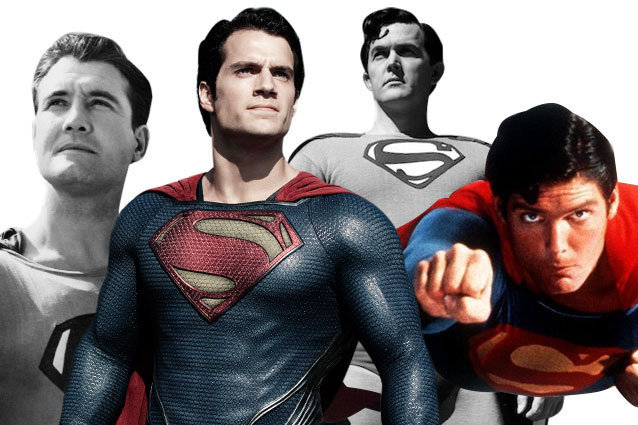
ABC; Columbia Pictures; Warner Bros. Pictures(2)
In celebration of Superman's 75th anniversary, and the release June 14 of the Caped Crusader's latest big-screen adventureMan of Steel, writer Larry Tye, author of Superman: The High-Flying History of America's Most Enduring Hero, Now Out In Paperback,
contributes this essay exclusively to Hollywood.com on the unique
qualities some of the actors who've played Superman — Kirk Alyn, George
Reeves, Christopher Reeve, and Henry Cavill — have brought to the role.Nobody is more All-American than Superman in his red cape, blue tights and bright yellow "S." So how is it that a Brit – a native of the Channel Islands and a product of a Buckinghamshire boarding school, with an English brogue no less – is donning the leotards and cape in the new Man of Steel movie?
Warner Bros' selection of Henry William Dalgliesh Cavill as our newest Superman seems ill-conceived if not profane, the more so coming just as America is celebrating its hero's milestone 75th birthday. But Cavill, a British heartthrob who played the First Duke of Suffolk on the Showtime series The Tudors, wouldn't be the first on-screen Man of Steel to defy convention and, in so doing, to soar higher than even his studio handlers dared dream.
Kirk Alyn, the original live-action Superman, was more a song-and-dance man than an actor, having studied ballet and performed in vaudeville and on Broadway in the 1930s and early forties. That's where he decided to trade in the name he was born with, John Feggo, Jr., for Kirk Alyn, which he felt was better suited to the stage. He appeared in chorus lines and in blackface, modeled for muscle magazines, and performed in TV murder mysteries in the days when only bars had TVs and only dead-end actors performed for the small screen. But he had experience in movie serials, if not in superheroes, so when he got a call from Columbia Pictures in 1948 asking if he was interested in trying out for Superman he jumped into his car and headed to the studio. Told to take off his shirt so the assembled executives could check out his build, the burly performer complied. Then producer-director Sam Katzman instructed him to take off his pants. "I said, 'Wait a minute.' They said, 'We want to see if your legs are any good,'" he recalled forty years later. They were good enough, and fifteen minutes after he arrived, Alyn was hired as the first actor to play a Superman whom fans could see as well as hear.
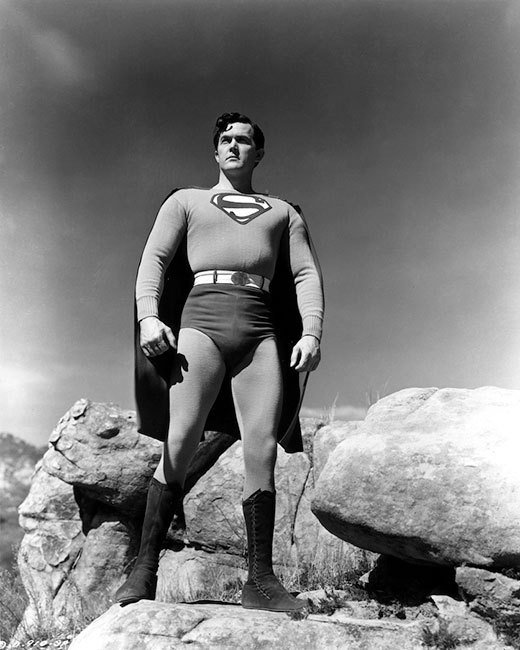
Columbia Pictures
Alyn and his directors were smart enough not to try and reinvent the
character that Bud Collyer had introduced so convincingly to the radio
airwaves. “I visualized the guy I heard on the radio. That was a guy
nothing could stop,” Alyn said. "That's why I stood like this, with my
chest out, and a look on my face saying, 'Shoot me.'" His demeanor said
"tough guy" but his wide eyes signaled approachability and
mischievousness, just the way creators Jerry Siegel and Joe Shuster had
imagined their Superman a decade before. Alyn understood, the same way
Collyer had, that kids could spot a phony in an instant. If they didn't
think Alyn was having fun – and that he believed in Superman – they
wouldn't pay to see his movies. His young audience, after all, didn't
just admire the Man of Steel. They loved him. Superman was not merely
who they dreamed of becoming but who they were already, if only we could
see. The good news for them was that Alyn was having fun, and he did
believe in his character in a way that these pre-teens and teens
appreciated even if movie reviewers wouldn't.In the 1950s, when Superman was gearing up for television, producer Robert Maxwell and director Tommy Carr screened nearly two hundred candidates who were sure they were him. Most made their living as actors, although some were full-time musclemen. Nearly all, Carr said, "appeared to have a serious deficiency in their chromosome count." So thorough – and perhaps so frustrating – was their search that the executives stopped by the Mr. America contest in Los Angeles. One choice they never seriously considered, despite his later claims, was Kirk Alyn, who had done well enough for the serials but had neither the acting skills nor the looks around which to build a Superman TV series. The search ended the day a barrel-chested B-movie actor named George Reeves showed up on the studio lot.
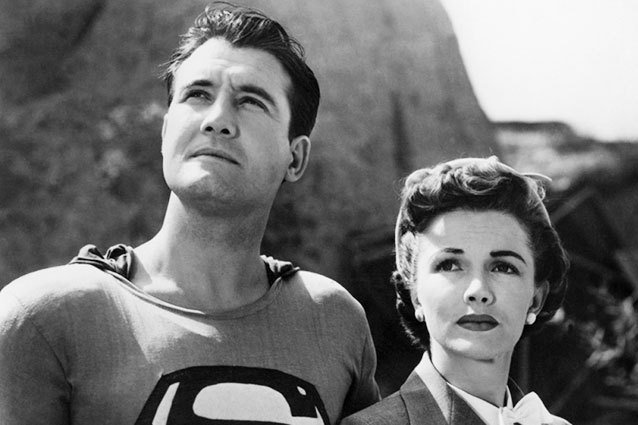
ABC
Maxwell's co-producer had recognized Reeves in a Los Angeles
restaurant, seeming "rather forlorn," and suggested he come in for a
tryout. He did, the next morning, and "from that moment on he was my
first choice," said Carr. "He looked like Superman with that jaw of his.
Kirk had the long neck and fine features, but although I like Kirk very
much, he never looked the Superman Reeves did." His tough-guy demeanor
was no put-on. Standing six-foot-two and carrying 195 pounds, Reeves had
been a light-heavyweight boxing champ in college and could have gone
further if he hadn't broken his nose seven times and his mother hadn't
made him step out of the ring.The Superman TV show, like other incarnations of his story, turned around the hero himself. Collyer, the first flesh-and-blood Man of Steel, had set the standard. He lowered and raised the timbre of his voice as he switched between Superman and Clark, making the changeover convincing. Maxwell's wife Jessica, the TV dialogue director, would follow Reeves around the set urging him to do the same – but he just couldn't master the switch. The result: a Superman who sounded just like his alter ego. They both swallowed their words. They looked and acted alike. There was no attempt here to make Clark Kent into the klutz he was in the comics. No slouching; no shyness. Reeves portrayed the newsman the way he knew, and that Jessica's husband told him to: hard-boiled and rough-edged, Superman in a business suit. The only differences were that Reeves would shed his rubber muscles and add thick tortoise-shell glasses with no lenses – that was the sum total of his switch to Clark Kent.
But it worked. It worked because fans wanted to be fooled, and because of the way Reeves turned to the camera and made it clear he knew they knew his secret, even if Lois, Jimmy, and Perry didn't. This Superman had a dignity and self-assurance that projected even better on an intimate TV screen than it had in the movies. Reeves just had it somehow. He called himself Honest George, The People's Friend – the same kind of homespun language Jerry and Joe used for their creation – and he suspended his own doubts the way he wanted viewers to. He looked not just like a guy who could make gangsters cringe, but who believed in the righteousness of his hero's cause. His smile could melt an iceberg. His cold stare and puffed-out chest could bring a mob to its knees. Sure, his acting was workmanlike, but it won him generations of fans. Today, when those now grown-up fans call to mind their carefree youth, they think of his TV Adventures of Superman, and when they envision Superman himself, it is George Reeves they see.
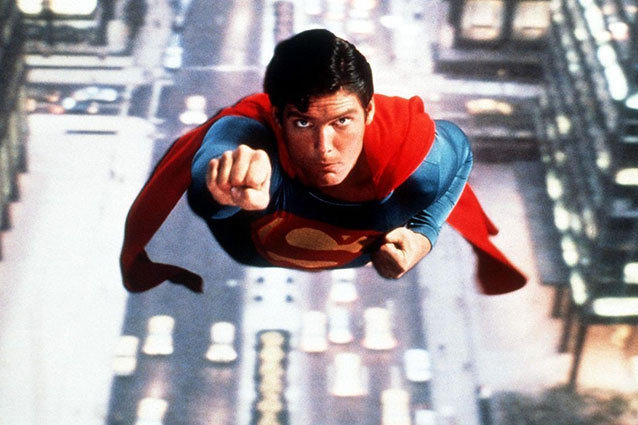
Warner Bros.
Christopher Reeve was an even less likely choice when producers set
out to find the right Superman for their 1970s motion picture
extravaganza. It wasn't just his honey brown hair and 180 pounds that
did not come close to filling out his six-foot-four frame. He had asthma
and he sweated so profusely that a crew member would have to blow dry
his armpits between takes. He was prep school and Ivy League, with a
background in serious theater that made him more comfortable in
England's Old Vic than its Pinewood movie lot. He was picked, as he
acknowledged, 90% because he looked "like the guy in the comic book . . .
the other 10% is acting talent." He also was a brilliant choice. He
brought to the part irony and comic timing that harked back to the best
of screwball comedy. He had dramatic good looks and an instinct for
melding humanism with heroism. "When he walked into a room you could see
this wasn't a conventional leading man, there was so much depth he had
almost an old movie star feeling," says casting director Lynn
Stalmaster. The bean counters loved his price: $250,000, or less than a
tenth of what Marlon Brando would get for the modest role as Superman's
dad. Director Richard Donner asked Reeve to try on his horned-rimmed
glasses. Squinting back at him was Clark Kent. Even his name fit:
Christopher Reeve assuming the part made famous by George Reeves. "I
didn't find him," Donner would say throughout the production. "God sent
him to me."Superman changed with every artist who filled in his features, writer who scripted his adventures, and even the marketers and accountants who managed his finances and grew his audience. Each could claim partial ownership. Actors like Christopher Reeve did more molding and framing than anyone and could have claimed more proprietorship. With each scene shot it was clearer that he was giving the hero a different face as well as a unique personality. Reeve's Superman would be funnier and more human – if less powerful or intimidating – than any who had proceeded him. He was more of a Big Blue Boy Scout now, in contrast to Kirk Alyn's Action Ace and George Reeves's Man of Steel. In the hands of this conservatory-trained actor, Supes was getting increasingly comfortable baring his soul.
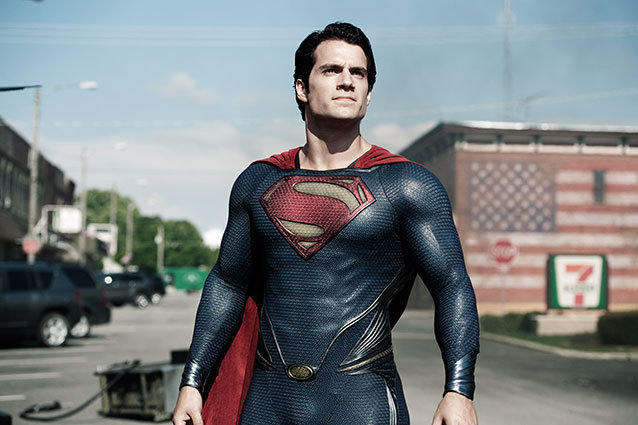
Warner Bros.
Picking up the role and the mythos now will be English actor Henry
Cavill, whose first appearance on the big screen was as Albert Mondego
in The Count of Monte Cristo (2002). Can Cavill make us believe
the way Reeve, Reeves, and Alyn did, and make us embrace a
British-accented Man of Metropolis?History suggests he can – provided he and Warner Bros. remember the formula that has served their hero so brilliantly for 75 years and counting. It starts with the intrinsic simplicity of his story. Little Orphan Annie and Oliver Twist reminded us how compelling a foundling's tale can be, and Superman, the sole survivor of a doomed planet, is a super-foundling. The love triangle connecting Clark Kent, Lois Lane, and Superman has a side for everyone, whether you are the boy who can't get the girl, the girl pursued by the wrong boy, or the conflicted hero. His secret identity might have been annoying if we hadn't been let in on the joke and we didn't have a hero hidden within each of us. He was not just any hero, but one with the very powers we would have: the strength to lift boulders and planets, the speed to outrun a locomotive or a bullet, and, coolest on anyone's fantasy list, the gift of flight.
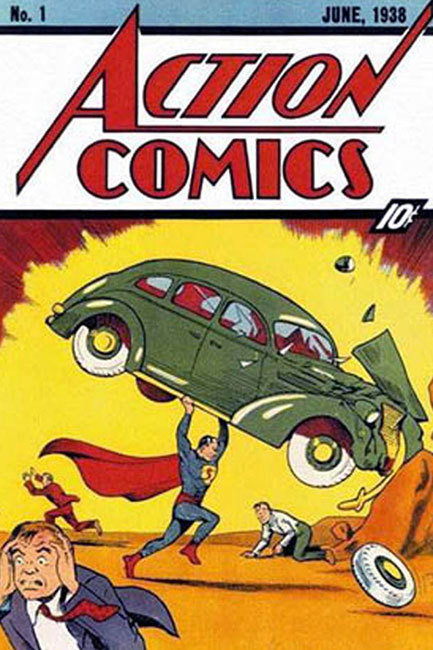
Action Comics
Superpowers, however, are just half the equation. More essential is
knowing what to do with them, and nobody has a more instinctual sense
than Superman of right and wrong. He is an archetype of mankind at its
pinnacle. Like John Wayne, he sweeps in to solve our problems. No "thank
you" needed. Like Jesus Christ, he descended from the heavens to help
us discover our humanity. He is neither cynical like Batman nor fraught
like Spider-Man. For the religious, he can reinforce whatever faith they
profess; for nonbelievers he is a secular messiah. The more jaded the
era, the more we have been suckered back to his clunky familiarity. So
what if the upshot of his adventures is as predictable as with Sherlock
Holmes: the good guy never loses. That is reassuring.There is no getting around the fact that the comic book and its leading man could only have taken root in America. What could be more U.S.A. than an orphaned outsider who arrives in this land of immigrants, reinvents himself, and reminds us that we can reach for the sky? Yet this flying Uncle Sam also has always been global in his reach, having written himself into the national folklore from Beirut to Buenos Aires. If Cavill acknowledges both sides of that legacy, the all-American and the all-world, then he should be able to reel back aging devotees and draw in new ones.
Larry Tye was an award-winning journalist at The Boston Globe and a Nieman Fellow at Harvard University. A lifelong Superman fan, Tye now runs a Boston-based training program for medical journalists. He is the author of the New York Times bestseller Satchel, as well as The Father of Spin, Home Lands, and Rising from the Rails, and co-author, with Kitty Dukakis, of Shock. He lives in Lexington, Massachusetts, and is currently writing a biography of Robert F. Kennedy.
No comments:
Post a Comment